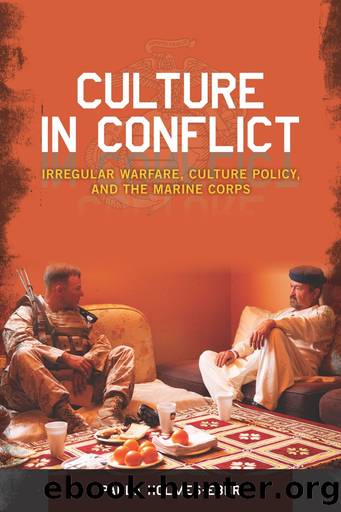Culture in Conflict by Paula Holmes-Eber

Author:Paula Holmes-Eber [Holmes-Eber, Paula]
Language: eng
Format: epub
Tags: Social Science, Anthropology, Cultural & Social
ISBN: 9780804791908
Google: 04w5AwAAQBAJ
Publisher: Stanford University Press
Published: 2014-05-21T03:22:54+00:00
SOURCE: CAOCL survey
NOTE: Using an inter-item correlation matrix for the five attitudinal questions, the Cronbachâs Alpha calculated for the five items was .852, indicating a strong positive relationship between all of the attitude questions.
Most interesting, however, were the responses from the Marines who held ground combat specialties (such as infantry, artillery, tank operators, and engineers).3 As discussed in chapter 2, the âguys on the groundâ are considered the heart of the Marine Corps. Although Marine Corps ideology describes the guys on the ground as the hard-fighting, hard-charging âgrunts,â according to the survey, it appears they are also the ones at the âtip of the spearâ in experiencing and responding to cultural challenges in theater. The ground combat Marines reported spending almost twice as much time interacting with the local population (47 percent) in comparison to other respondents (29 percent). For laymen, in statistical terms, the probability (p) that these differences could simply exist by chance is less than 1 in a 1,000 (p < .000).4 Not surprisingly, the âguys on the groundâ stated they also used language skills (p < .000)5 and cultural skills (p < .000)6 significantly more often to accomplish the goals of their mission than their combat support partners. And reflecting their view that these skills were important to accomplishing the mission, the âguys on the groundâ ranked the importance of using language skills (p < .000)7 and understanding the local culture (p < .000)8 significantly higher than combat support respondents.
One of the more important results of these survey findings was that Marines considered cultural skills to be significantly (in repeated statistical tests) more important than language for enabling mission effectiveness.9 One possible reason that emerged from the qualitative data was that in many cases Marines had interpreters who could translate the language for them, and so given the difficulties in learning non-European languages such as Arabic, they preferred to turn to native speakers to assist them.
Culture as a Decoding Problem: Subject Matter Experts, âTerps,â and Heritage Speakers
As Sayyidâs story at the beginning of this chapter poignantly illustrates, one of the first steps the Marine Corps (and other services) took at the beginning of the invasion in Iraq was to hire or locate individuals within the Marine Corps and other services who understood the culture and language of Iraq. This early solution to the problem reflected the militaryâs and Marine Corpsâ assumption that culture and language (which were considered as virtually synonymous and interchangeable in the first couple of years of the culture venture) could be âdecoded.â
One long-established military occupational specialty (MOS) is that of the cryptolinguistâdecoders who study the secret messages of the enemy in order to figure out what the enemy is doing. Not surprisingly, then, one initial view of culture was that it was simply another language code that could be broken with the right tools or interpreters. In this view, culture/language was a code that military cryptolinguists or their translators and subject matter experts (SMEs) could easily decode with enough time and resources.
Download
This site does not store any files on its server. We only index and link to content provided by other sites. Please contact the content providers to delete copyright contents if any and email us, we'll remove relevant links or contents immediately.
Zero to IPO: Over $1 Trillion of Actionable Advice from the World's Most Successful Entrepreneurs by Frederic Kerrest(4500)
Machine Learning at Scale with H2O by Gregory Keys | David Whiting(4290)
Never by Ken Follett(3931)
Harry Potter and the Goblet Of Fire by J.K. Rowling(3843)
Ogilvy on Advertising by David Ogilvy(3598)
Shadow of Night by Deborah Harkness(3356)
The Man Who Died Twice by Richard Osman(3068)
Book of Life by Deborah Harkness(2929)
The Tipping Point by Malcolm Gladwell(2909)
Will by Will Smith(2904)
0041152001443424520 .pdf by Unknown(2843)
My Brilliant Friend by Elena Ferrante(2823)
Purple Hibiscus by Chimamanda Ngozi Adichie(2811)
How Proust Can Change Your Life by Alain De Botton(2801)
How to Pay Zero Taxes, 2018 by Jeff A. Schnepper(2643)
Hooked: A Dark, Contemporary Romance (Never After Series) by Emily McIntire(2544)
Rationality by Steven Pinker(2349)
Can't Hurt Me: Master Your Mind and Defy the Odds - Clean Edition by David Goggins(2319)
Borders by unknow(2301)
